One of the beautiful things about traveling is that most people can do it. It’s just a question of how.
There are many ways you can travel cheaply. And even if you don’t mind spending some dough, chances are you can do more than you think.
You just need to know how.
I’ve been traveling solo since 2014. Visited hundreds of destinations. Consumed countless travel books, guides, and podcasts. And my goal with this article is to share with you everything I know.
And it will be very specific and practical so you can apply everything yourself.
No fuzz.
Including how to:
- Plan your trip and prevent common pitfalls
- Estimate the total amount of money you’ll need
- How to take your career online and travel indefinitely
- Easy money-saving hacks that help you travel ASAP
- Must-have items and gear and what to avoid
- What and how to pack for practicality and comfort
- And so much more…
But before all this, I want to give you an example of how far the boundaries of traveling can go.
📖 Table of Contents
- 1. Introduction: Meet Tomislav Perko
- 2. Should You Travel Solo?
- 3. How to Work While Traveling
- 4. Should You Plan Your Travels?
- 5. Picking Your Destinations
- 6. Choosing Proper Travel Insurance You Can Trust
- 7. How To Find the Right Backpack
- 8. What to Buy & How To Pack
- 9. How to Estimate the Costs of Your Travels (Free Tool)
- 10. Essential Preparation
- 11. Transportation
- 12. Accommodation
- 13. Common Travel Mistakes To Avoid
- 14. How to Avoid & Deal with Travel Burnout
- 15. When People Ask You Why You Travel
1. Introduction: Meet Tomislav Perko
Tomislav Perko is a guy from Croatia who previously traveled the world on a budget of only $10/day from 2011-2014.
His story changed the way I saw traveling forever.
I recommend watching his Ted talk before continuing (he’s a funny guy):
I know that the way he traveled isn’t for everyone. Many of the things aren’t for me either.
But the goal is to give you the widest perspective possible when it comes to the options you have for traveling the world.
And from there take whatever resonates with you, and let the rest be.
2. Should You Travel Solo?
I’m mentioning this early for a reason.
I want to make sure that you’re not holding yourself back unnecessarily waiting for someone else.
In most cases, I recommend traveling solo. But it depends on the relationship with the person you intend to travel with.
If it’s someone you’re very close with, that you can be yourself around and you trust, it increases the possibility of it being a good idea. Such as your very best friend or partner.
But you should never travel with someone only out of fear of traveling solo.
The key is to only travel together with someone if it creates a synergetically better experience for all parties. And never because you feel you have to.
Pros and Cons of Solo Traveling
✅ Your dreams about traveling don’t rely on someone else (aka actions out of your control)
✅ You’ll dramatically increase the potential for personal growth in many aspects
✅ You’re more likely to meet new people
✅ You’ll have maximum flexibility
❌ The possibility of missing familiar and close relationships
❌ Choosing private rooms will be more expensive with no one to share them with
Remember that traveling solo doesn’t necessarily mean traveling alone.
You’ll still meet people to do activities and share experiences with.
Good Things to Know if You’re Traveling With Someone
If there’s someone you’re dreaming about traveling with, and you’re convinced it’s the right thing to do, lucky you!
You should go for it.
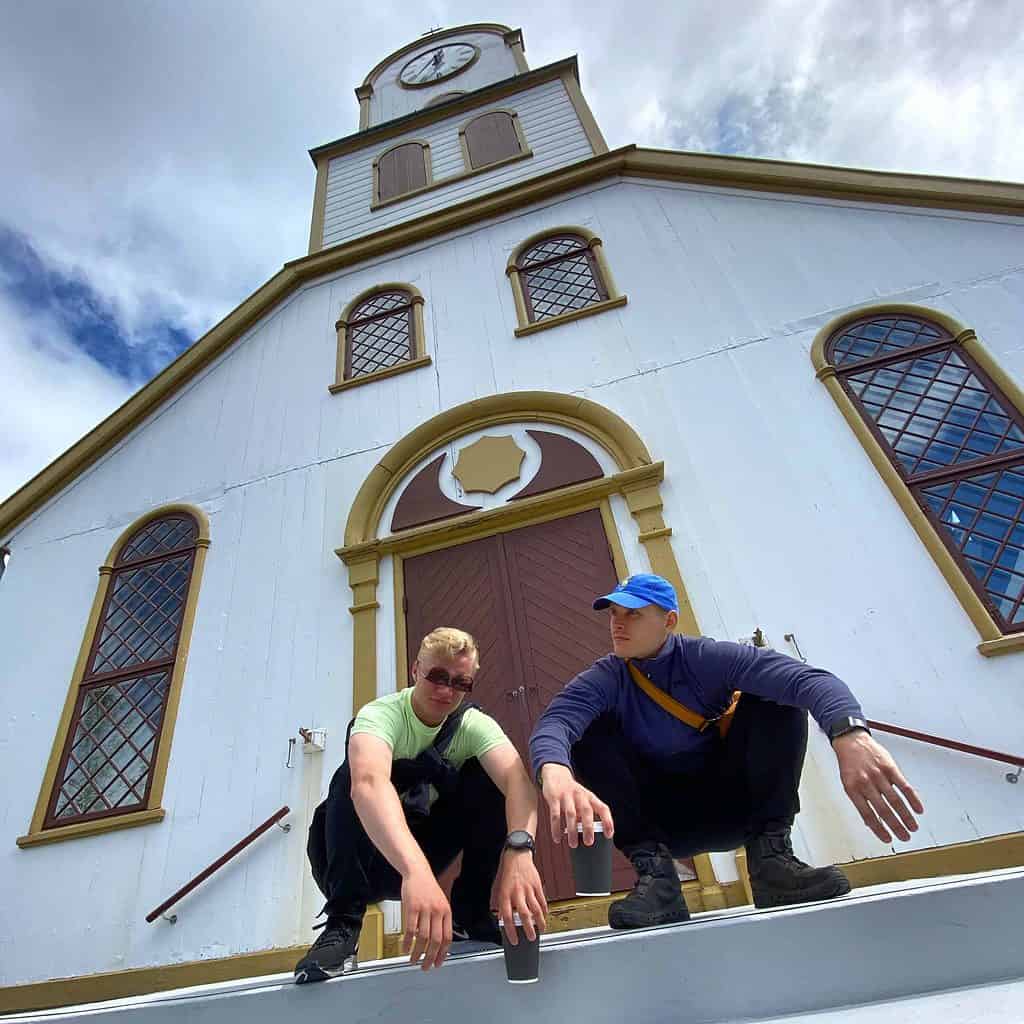
But if you’ve never traveled solo, I still suggest making some space for it despite traveling with someone.
For example in the middle of your trip, or after 3 months or so traveling together if it’s a longer trip.
By doing so chances are you’ll get a healthy break from each other. But most importantly you get to experience what it means to travel solo.
3. How to Work While Traveling
Now to something you’ll find at the top of my gratitude list.
Being born in a time where online/remote work is not only possible but also acknowledged and accepted like never before.
And where most people can earn a living online if they invest enough time and energy.
For many people, this is the quickest way to start traveling full-time.
If you’re interested in learning how I recommend reading my guide on how to work and travel at the same time:
4. Should You Plan Your Travels?
Now that you hopefully found enough inspiration for your travels, or either confirmed your current ideas, it’s time to create the master plan for your travels.
With that said you don’t necessarily need to make a plan.
But if your trip has a fixed duration and budget, it’s a good way to make sure you spend your time and money as efficiently as possible.
When you look at your actual budget and compare the numbers it’s also easier to see how expensive one destination can be compared to your other options.
For example, maybe you realize you can spend 2-3 x times longer in South East Asia compared to Australia with the same budget, and therefore pick that instead.
I prefer to plan destinations, accommodations, and to a certain extent activities if I’m going on short trips typically lasting up to a month.
If I’m going on longer trips not as much, but I still like to have an idea of where I’m going. This way I keep track of my budget, and I can better plan for different weather and activities.
5. Picking Your Destinations
Maybe you don’t know the exact destinations yet, but having an idea will also do.
Besides needing it to book your first flight tickets or other initial transportation.
You also need to have an idea of your destinations to:
- Buy the right travel insurance
- Get recommended vaccines
- Know what travel gear to invest
- What and how to pack
- Estimate the costs of your travels (optional)
- Know how long you need to save up money (optional)
- Estimate how long you can travel based on your budget (optional)
But if you’re here chances are you already dream about certain destinations.
How Long Should You Visit Each Destination?
This is where it gets tricky.
How long you should visit a country or city depends on a lot of factors including your preferred traveling style.
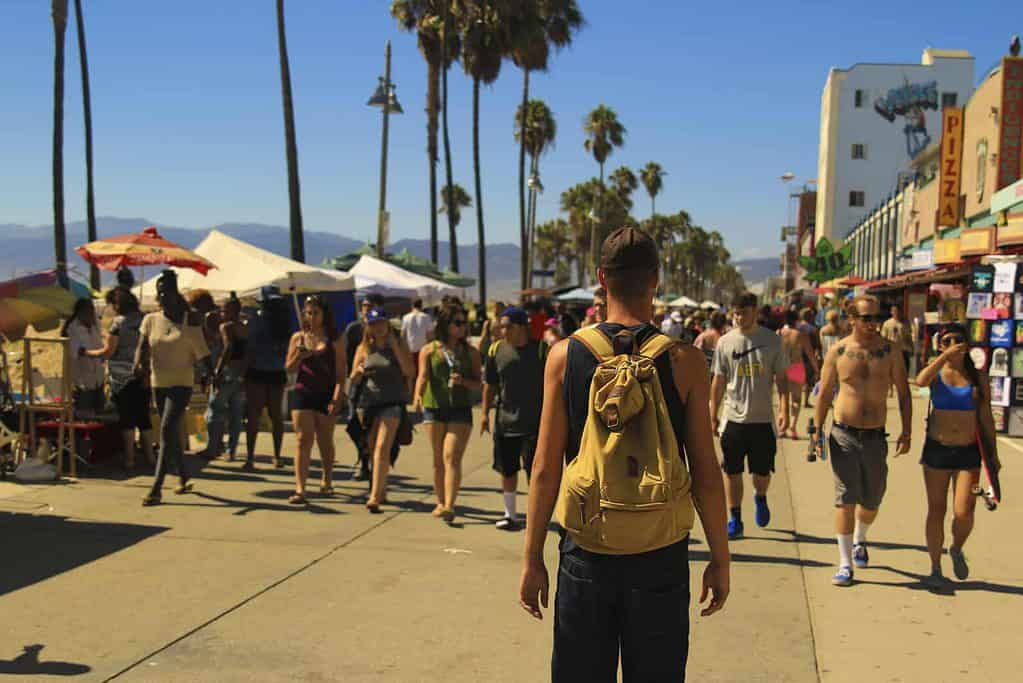
But based on my experience and other travelers, I still have a pretty good idea.
If I’m traveling from city to city I usually stay 3-4 nights in bigger cities and 1-2 nights in smaller ones. And if I’m on a longer trip I usually spend 21-89 nights in a country in total.
From my experience, I start to get used to an environment after 3 weeks, which makes it a good time to explore a new country.
But if I’m on a longer trip, I sometimes spend more time in each country allowing me to experience it on a deeper level.
And since many countries offer visas of between 30-90 days it sets the time frame.
📌 TIP: If you're in doubt about how long time to spend at each place. Consider spending more time somewhere in exchange for fewer destinations. It's a matter of quality rather than quantity.
6. Choosing Proper Travel Insurance You Can Trust
Now that you have a better idea about your itinerary, it’s time to make sure you’re taken care of in case of trouble.
If you’re not sure about the destinations, duration of your trip, or activities you’ll participate in, make sure to buy insurance with the option of upgrading later.
What To Look Out for When Buying Travel Insurance
Don’t make the mistake of thinking that all travel insurance is equal.
There’s a big difference in coverage and support in case shit hits the fan.
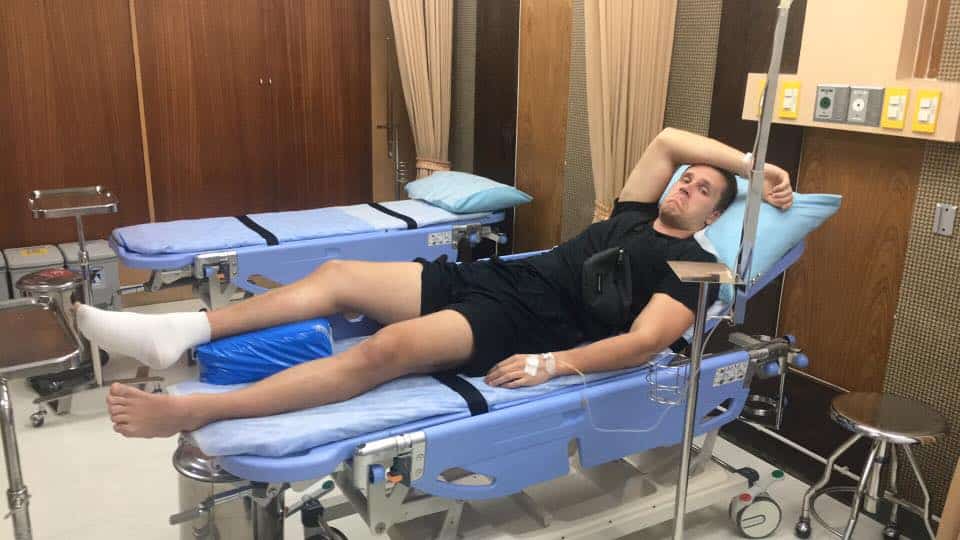
Here’s an example of things I suggest looking out for:
- Coverage of all medical expenses (min. $1 Mio for travels outside the US / $2 Mio inside the US)
- Getting you back home in case of the need for emergency treatment
- Personal liability coverage (min. $2 Mio)
- Coverage of more than 90 days if your trip is longer
- That all activities you might participate in are covered – don’t assume anything that isn’t clear in the policy (for example scuba diving or working abroad)
- 24/7 video calls with doctors and other specialists (this is insanely helpful and creates a lot of peace of mind).
📌 TIP: I also recommend getting one without an excess fee if you have the option. Waiving it will cost a little extra, but you'll be more likely to use your insurance in those cases where you know you should but the excess fee is holding you back. In case you decide to go with an excess fee anyways, make sure to check how much it is, and whether you only have to pay it once or every time you need your insurance on a trip. I've been surprised by how large the excess fee can be compared to the insurance when researching this.
Recommended Travel Insurances
If you’re based within the UK or EU I highly recommend True Traveller.
They were my go-to travel insurance when I lived in Latvia before moving back to Denmark.
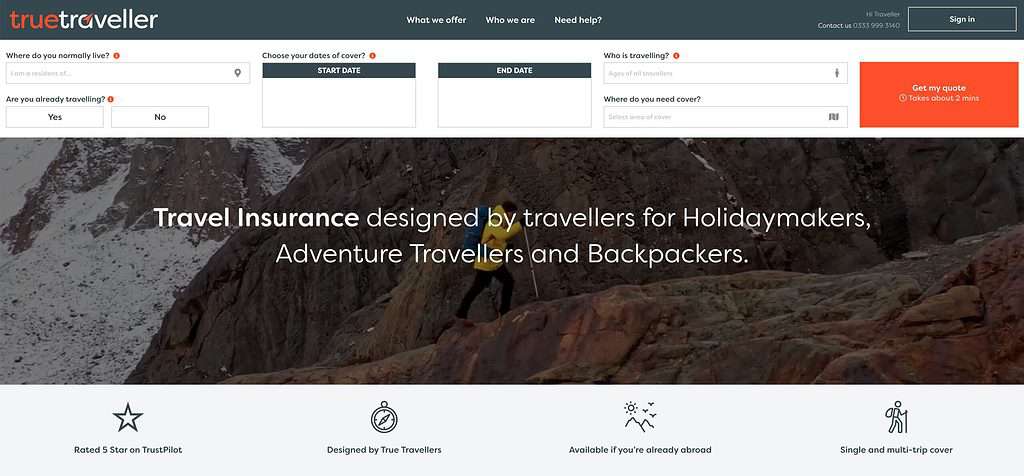
Their product and service are amazing, and it’s always been smooth and painless the times I’ve made claims with them.
I, unfortunately, don’t know any insurance I can recommend for citizens outside of the UK and EU.
But when you’re looking for one just look out for the things mentioned above.
📌 TIP: Driving a motorbike is the main way of transportation in many parts of the world. But a huge misconception among travelers is that you don't need a motorbike license abroad. Or that a normal car license will do. Just because you're able to rent one, doesn't mean that it's legal. If you end up in an accident without a valid license or wearing a helmet when it's required by law, there's a risk your insurance won't cover. So if you're planning to travel for a long time or indefinitely, consider getting a license at home before departing.
7. How To Find the Right Backpack
When you’ve been on the road for a while, chances are you’ll start to connect with your backpack on a new level.
Along with what you’ve packed it becomes the only default thing in an ever-changing environment.
I even had a few intellectual chats with my backpack before. I’m not gonna lie.
While choosing the right backpack is almost a religion to some, there’s no need to overcomplicate it.
But it is important to get the basic things right.
Investing in the right backpack will make your trip much more comfortable.
You should pick a backpack that’s:
- Large enough but as little as possible
- Designed to safely store more fragile items such as a laptop if you plan to bring one
- Either rainproof or compatible with a rain cover
- Comfortable carrying the weight you want to bring
- Durable and won’t fail you (especially the zippers and straps)
- Practical for the dynamics of traveling in terms of pockets and other features
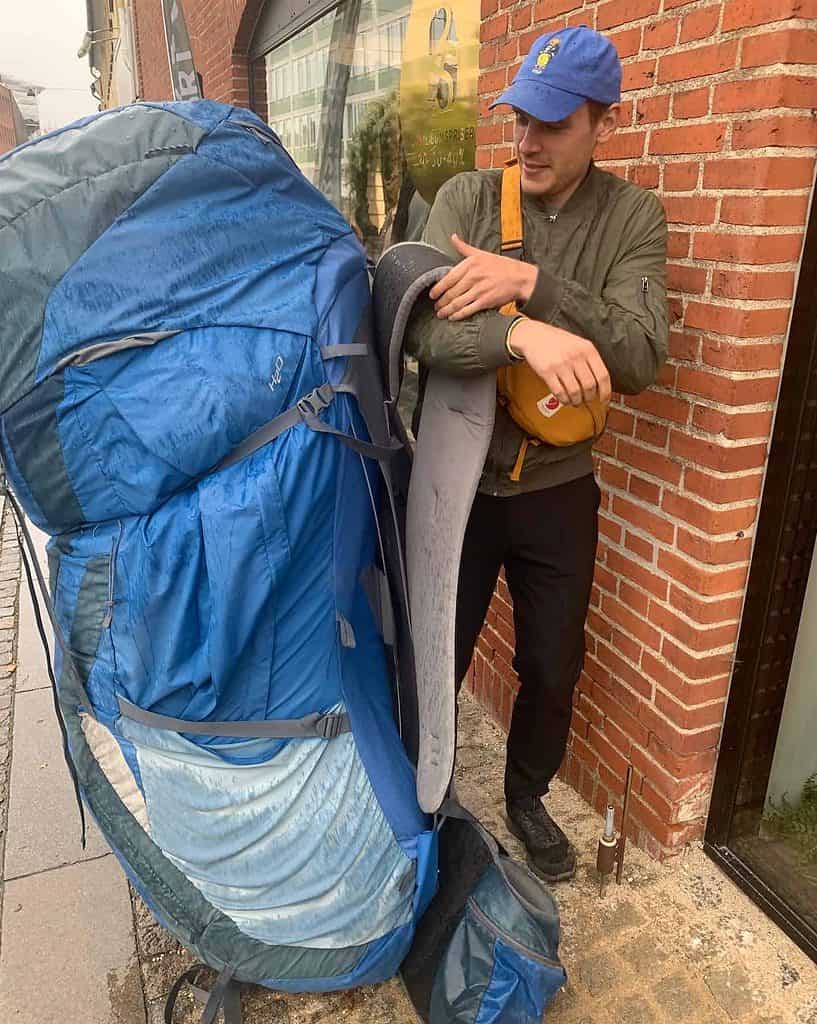
With that said it’s easy to go wrong here since backpacks can differ a lot. Even within the same brand.
Therefore to find the right backpack, I recommend ordering different models with the above in mind. On top of trying to pack them and carry them around at home.
Be careful to not break anything though, so you can return the ones you don’t need.
📌 TIP: My favorite backpack for longer trips is the Osprey Aether Plus 70 (70 L). Not only does it fulfills all the needs above. I also feel more comfortable wearing it sometimes. There's both a male and female version available in different sizes. And for shorter trips, I recommend the Tortuga Outbreaker (30-40 L).
Aim for a Backpack of 30-40 Liters or Less if You Can
Let me just start by saying that it can be really hard to stay under 30 liters on longer trips. 40 liters is more doable, but can still be challenging.
With a maximum of 30 liters, you’ll be safe in terms of meeting the limits of carry-on luggage on flights all over the world.
And with a maximum of 40 liters, you’ll be safe in the US and most likely on all other flights too.
While technically 40 liters is over the limit for many airlines outside of the US, it doesn’t mean it’s not possible.
Though you’d risk being asked by the airport staff to check it in certain situations. This can also happen if the weight exceeds the often small limit of carry-on luggage.
Usually, they’re limited to around 17,6 – 22 pounds (8 – 10 kg.).
Whether you’ll be asked to check in your luggage depends on the crew and the airport in my experience.
But if it’s obvious that your carry-on luggage is too big or too heavy it might increase the risk.
Therefore to make this work, you most likely have to avoid overpacking the backpack too.
📌 TIP: Later we'll get into how you can pack as light and smart as possible despite the size of your backpack. Including certain hacks on how to get extra liters of luggage on flights without paying extra.
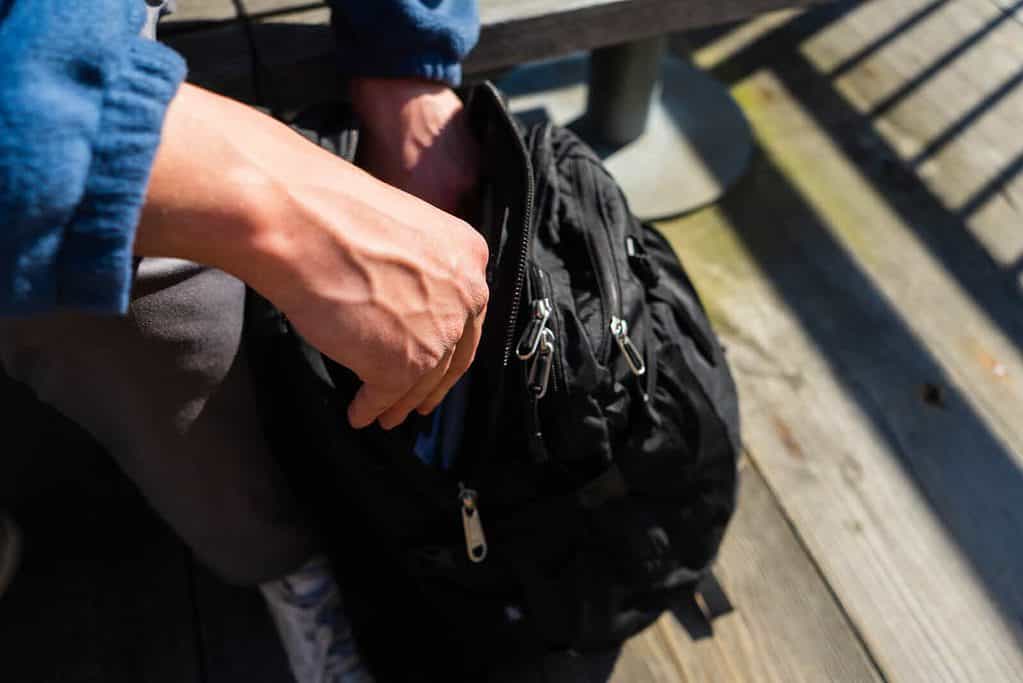
The Pros and Cons of a 30-40 Liter Backpack:
✅ With limited space it will most likely be lighter, making your journey much more comfortable
✅ You might be able to avoid checking in your luggage. This will save you a fair amount of money, decrease the time spent in airports, and eliminate the risk of losing it in the process
✅ The smaller size makes it more practical (especially in cars, busses, and trains)
❌ It can be challenging to pack everything you need. Especially if you’re planning on crossing different continents and climates
❌ If your backpack is exceeding 30 liters and the airline’s weight limit for carry-on luggage you can be asked to check it in at the airport.
I’ve never heard of a situation where you can’t. And I couldn’t find examples of it online either.
But if you’re flight is part of a longer journey, consider paying for check-in in advance just in case.
📌 TIP: You don't need a backpack with a dedicated laptop holder to store your laptop safely. With a proper laptop sleeve and packing, chances are you'll be fine. Especially if it has a built-in holder for a water reservoir like many backpacks do.
8. What to Buy & How To Pack
Now to something I’ve also spent loads of time and money on.
Businesses are making millions in the travel industry by convincing you that their product is a must-have for travelers.
No wonder it’s easy to get caught up in the “how” instead of the “why”.
I’m here to help you differentiate between what items are “nice to have” versus the “need to have” when traveling the world.
So you can spend your money on what matters. And make your travels much more enjoyable by carrying less weight and volume.
I’ve previously published a guide on how to pack light. I highly recommend going through before continuing:
9. How to Estimate the Costs of Your Travels (Free Tool)
Now it’s time to get serious.
And as for the seriousness, we need to consider my backpacking budget calculator and its accompanying guide.
While we can often do without a plan. Without money, we won’t go far.
I’ll show you how to:
- Estimate the number of months you have left to save money for a trip based on your income and expenses (before, during, and after the trip)
- See the impact even your small income and expenses have over time (before, during, and after the trip)
- Get 360-degree insights into expenses you might haven’t thought of related to traveling.
10. Essential Preparation
Now it’s time to set things in motion.
Mandatory and Important Documents
What these things have in common is that it can take several weeks to be ready.
Therefore it’s a good idea to execute them as soon as your trip is safe and you know the departure date.
This includes:
- Passport
- Visa(s)
- International driver’s license (IDP)
- Medical prescriptions (in English)
📌 TIP: I go in-depth on all of the above in my other guide on what information you need to book an international flight, including tips on how to keep everything safe throughout your trip.
Vaccines
The vaccines you need depend on three things:
- The countries and areas you plan to visit
- The duration of your stay
- The activities you’ll attend to
When you know the above, you can check what vaccines are recommended by checking the Centers for Disease Control and Prevention website.
While the price tag(s) might make them tempting to skip, keep in mind that many of the vaccines last for +10 years to a lifetime.
And don’t forget they are made to save your life or avoid serious (chronic) diseases.
Being fully vaccinated often takes a few shots over time (often within 28 days), meaning you should secure appointments according to your date of departure.
📌 TIP: I suggest getting your last shot at least a few days before your trip. By that, you'll have some time to recover in case the vaccines cause you any symptoms.
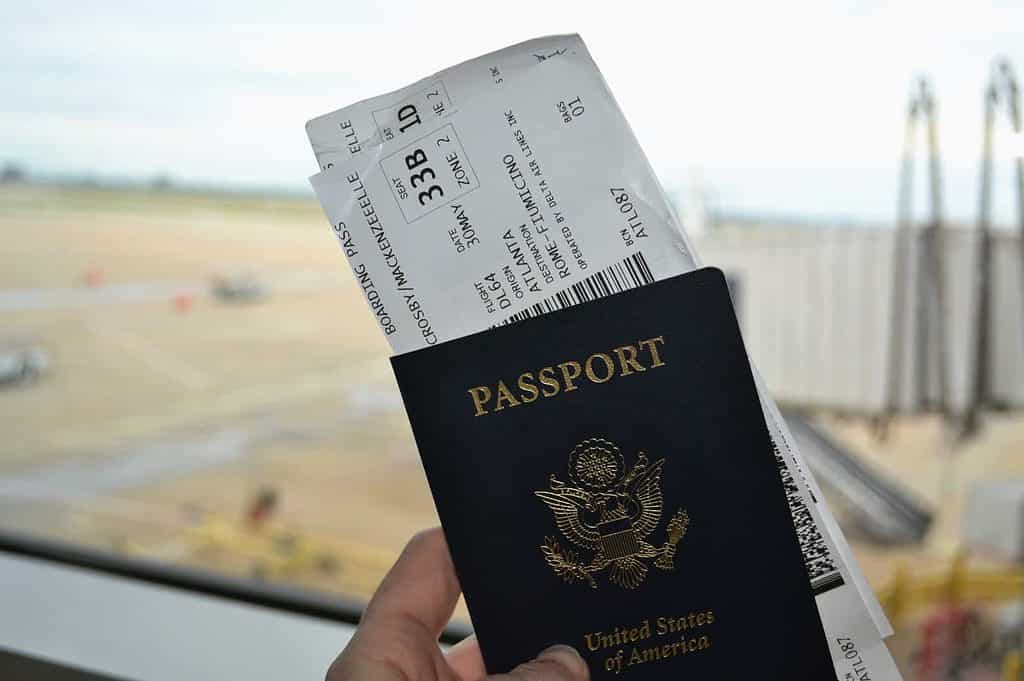
11. Transportation
Flight Ticket(s)
Before you book your next flight, I highly recommend reading my comprehensive guide on how to save money on flight tickets (and secure the best flights).
With over 9 years of travel experience and booking 300+ flights, I’ve distilled my findings into a 19-step checklist.
By following this guide, you’ll gain practical knowledge that can potentially save you thousands of dollars in travel costs.
Including how to:
- Maximize savings by looking up the best time to book flights
- Set up price alerts if the price of your tickets drops and save even more
- Earn cashback and save by using my recommended booking platforms
- Save money on extras like baggage fees through smart planning
- Discover budget-friendly hacks for your flight day and save on seat reservations and food.
Busses, Trains & Ferries
When it comes to finding the best combination of busses, trains, and ferries I recommend Rome2Rio.
The quality of the results you’ll find is generally amazingly correct and in-depth.
Sometimes the information can be a little bit of. In that case, I suggest you just double-check the information elsewhere.
Car & Motorbike Taxies
I have yet to find one universal “Uber” app that covers all countries.
Therefore I suggest researching the most popular apps in each country you visit.
I also suggest doing it before you arrive in a new country. So you can already start using them from the airport.
In most cases, the apps are cheaper than regular taxis. Especially the ones found at airports.
Other Public Transportation
I primarily use Google Maps public transport function if they provide the data in a given country.
If not, chances are you can an official local app or website to plan your route, buy tickets, etc.
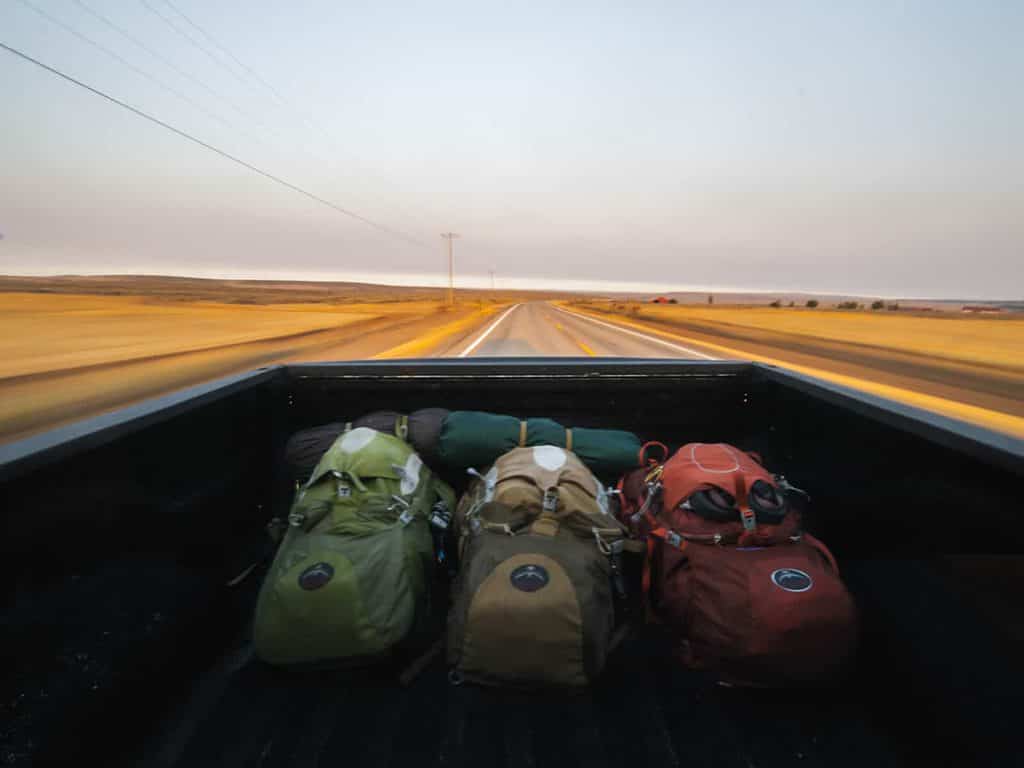
Hitchhiking
I’m aware this option isn’t for everyone.
But if you dare to challenge yourself, it’s one of the most authentic and rewarding ways of traveling.
And not only that – but it’s also free.
If you watched the video at the beginning of the article introducing Tomislav Perko, you’re already familiar with a few of the do’s and don’t of hitchhiking.
If you consider it I suggest reading my designated guide on how to hitchhike:
12. Accommodation
Regarding planning, some like it wild and unpredictable, while others prefer to know where they’re staying their whole trip.
My suggestion is that you’re booking as little as possible, giving you the most flexibility.
It’s hard to predict how a certain destination or place is based on research alone. So there’s no reason to run the risk of thighing yourself up to a specific place you end up not fancying.
The only exception where I like to have everything booked is on shorter trips where the flexibility is low.
In those cases, it’s nice to have everything secured, so you get the most out of a journey by spending as little time as possible on planning on the way.
Hostels
This is my preferred option for many reasons.
There’s a reason hostels are the most popular choice among travelers:
- They’re often the cheapest option (but not always)
- Their locations are often among the very best
- They usually offer several group activities and tours
I’d even pay more to stay at a hostel than a hotel in most cases if I had to.
And if I need a bit of privacy, the private rooms offered here will often do.
My go-to website to book and find hostels is Hostelworld.
Hotels
I usually stay at hotels if I need a break or to spoil myself with some more luxurious amenities like a spa, etc.
Sometimes you can also find large discounts on nice hotels. Making it a tempting option when you’re in the mood.
I mainly use Booking.com to book hotels depending on the best options, prices, and terms.
📌 TIP: If it seems like there's a lot of space at a certain hostel or hotel. Consider going there directly and asking for a better price if you book directly with them.
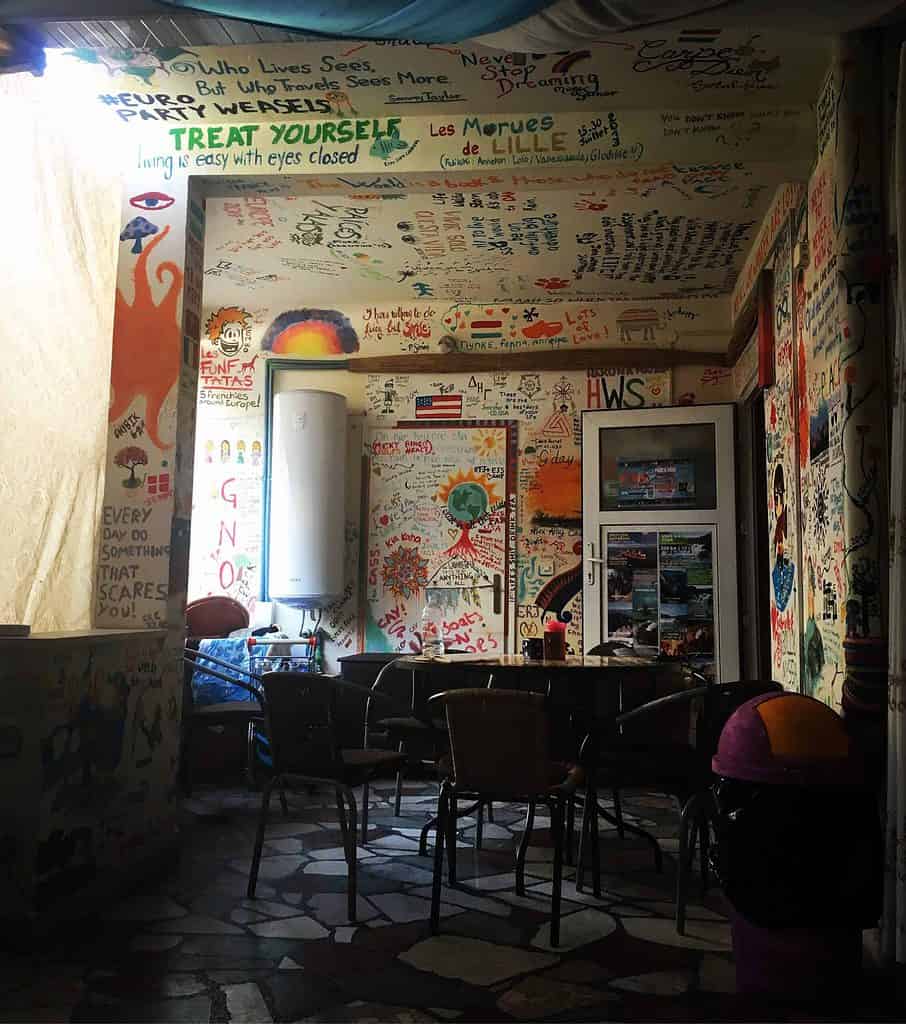
Airbnb
I usually use Airbnb in more rural areas where it’s the only option or for longer stays.
Since the majority of their accommodations are owned by locals the places are also more authentic and unique.
And sometimes the cheapest too.
How To Save Money With Airbnb:
- Open new tabs with the places you’re interested in
- Send a direct message to the owner with something like:
“Hey! I would love to rent your place. It’s just a bit over my budget. Would you be willing to offer a bit of a discount?”
I’ve yet to try this trick myself. All credit goes to Drew Binsky.
Facebook Marketplace
This is a hidden gem and a badly underrated option for longer stays (1-3+ months) I never see anyone talk about.
As the title suggests we’re talking about Facebook Marketplace
I’ve used it to find apartments in Thailand almost 50% of the price of the same places that could be found on Airbnb.
The only catch is that you often need to rent the places for at least a month. And sometimes longer.
But if you’re going on a longer trip chances are you want to settle for a while at some point anyways.
Couchsurfing
If you’re not familiar with it, “Couchsurfing” covers a range of websites where you can find people who offer you to stay at their homes for free.
If this excites you you’re far from alone.
It’s one of the most rewarding ways to travel. Staying with locals will give you a unique experience you won’t find anywhere else.
📌 TIP: I go in-depth about how to couch surf in another guide of mine: "3. 📌 TIP: "Couchsurf" for Free Accommodation".
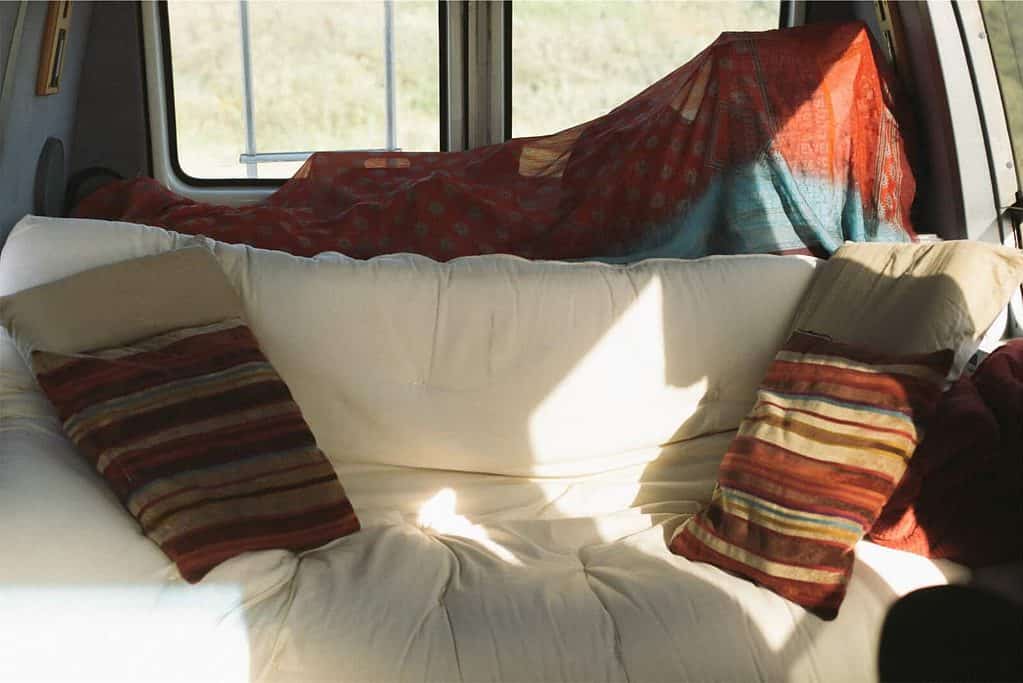
13. Common Travel Mistakes To Avoid
Before a trip, we’re usually not worried about anything else than getting going.
And that’s fine.
But once you’ve taken the initial steps and your trip is getting closer. It’s worth keeping certain things in mind.
Aka the typical pitfalls, travelers tend to run into.
Overpacking
Let’s start with something occurring before the trip has even started.
The rule of thumb is not to pack heavier than 20% of your body weight.
And despite that, it’s still better to pack as little as possible.
If you’re not an experienced traveler chances are you’ll be guilty of this no matter how much you prepare.
But if you do you have options. Such as sending some of your items back home, selling them, or giving them away.
Overprepared or Underprepared
As with accommodation, I suggest preparing as little as possible depending on the length of your trip.
The longer the trip, the more flexibility you potentially have to plan less (and vice versa).
Imagine achieving the trip of your life, just to waste a big percentage of it glued to a screen.
How sad would that be…
If you’re aware that you’re a heavy user of social media, consider making some rules for yourself before departing.
This could be limiting your use to an X amount of time every day. And for example in the evening after a day of traveling.
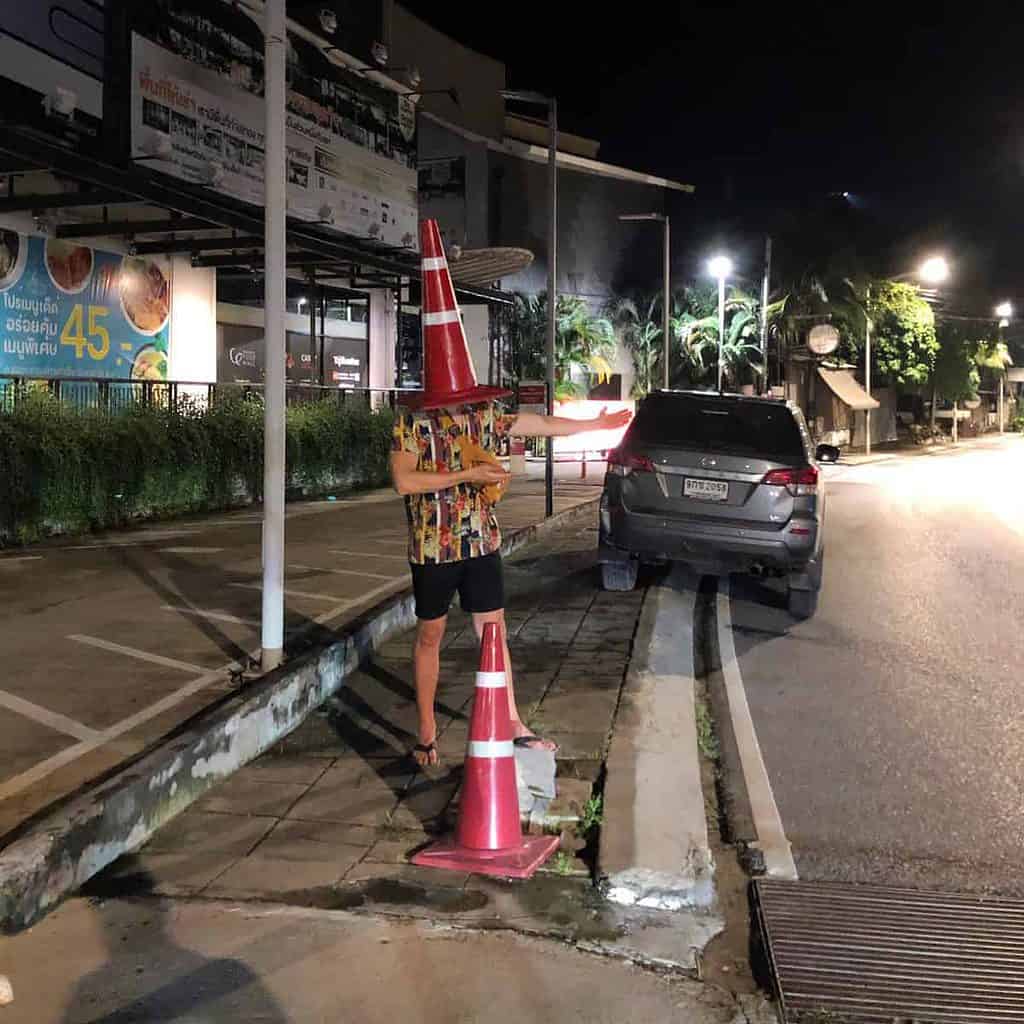
Partying Too Often
I love partying, and it’s something I always prioritize when I travel.
But it’s a good idea to be aware of the money, energy, and focus you sacrifice in exchange for it. Especially on longer trips.
If we’re doing it too much our brain does this tricky thing of adapting to it and gets addicted to the dopamine receptors going full throttle.
And when that happens, it can be challenging to break the habit and find all the other things traveling offers appealing.
A good way to deal with this is to plan breaks from it.
For example, by hiking for a few days, or going somewhere for a longer period where you know you’ll be busy with other things.
Partying is fun. But too much of it is counterproductive.
Finding the sweet balance is where we get the most out of everything.
Not Leaving the Tourist Bubble
Naturally being a tourist it’s easy to get caught up doing tourist things.
And that’s all good to an extent! Don’t get me wrong.
But too much of anything isn’t good.
And if you’re limiting yourself by only walking the tourist trail, you’re missing out.
A good way to break this is by taking the less-beaten path.
Examples of this could be staying with locals through Couchsurfing, volunteering, or eating at hyper-local restaurants.
Learning by Doing
Chances are you’ll make some of these mistakes sooner or later.
And that’s fine.
Remember that they’re an opportunity to learn and grow.
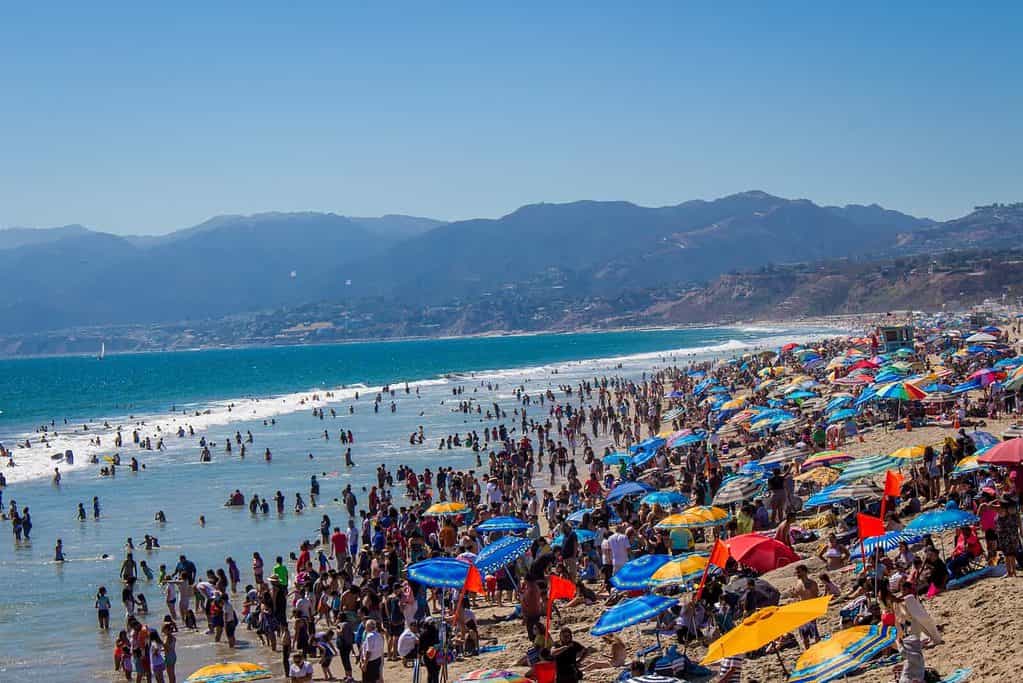
14. How to Avoid & Deal with Travel Burnout
The thought of burning out can be alien in the phase of excitement before a trip.
Nonetheless, no one within the biological limits of the human body can go full throttle all the time without a break.
Understanding the signals your body and mind send you when it’s time for a break usually comes from experience.
And if it happens, there are fortunately a lot of nice options for dealing with it.
Consider a Flexible Routine
Introducing a bit of routine into your travels can be a good way to stay healthy and sane.
This can for example be by following specific workouts X times a week, meditating, reading books, scheduling alone time, etc.
Settle Down for a While
Settling down for a month or two (or more), is a good way to recharge yourself.
But it’s also often the only way to immerse yourself further into a destination or country you like.
Become One With Nature
Some people can’t live without spending time in nature, and others don’t seem to care much.
For many nature is equal to inner peace, balance, and happiness as a result.
For example, this can be achieved in a more active way like hiking. Or simply just by finding a spot with a good view and chilling for a while.
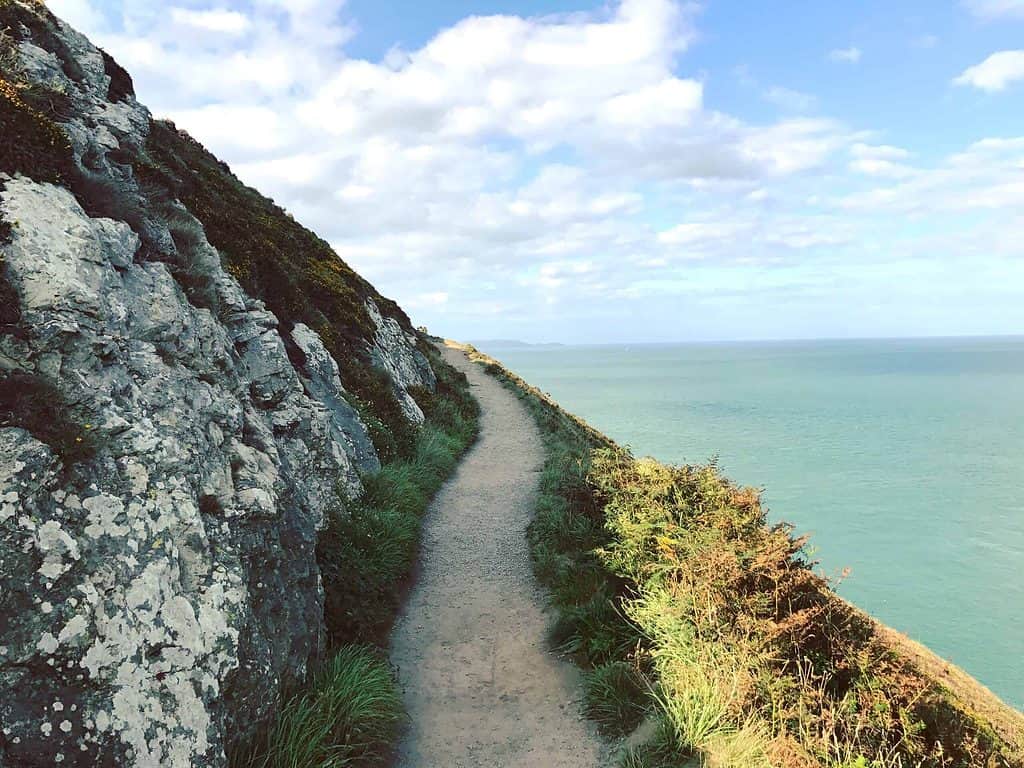
Go Full Charter
And find your pool towel, sunscreen, and love for ice cream.
Or those cucumber things they always glue to their eyeballs in movies.
In other words; it’s time to go full charter.
Sometimes we just need to relax and spoil ourselves a bit.
Call Your Friends and Family
Sometimes the solution to things is right in front of us.
One of the bad things about traveling can be the long periods away from our close ones.
While it can also be a relief in the right amount, there are times when we just need to grab the phone or jump in front of the laptop to connect for a bit.
Go Home for a While
If you’ve done your best to adapt but without any luck, maybe it’s just time to go home for a bit.
There’s nothing wrong with taking a vacation from the vacation as you say.
If you end up in this situation chances are you’re just fortunate enough to have been traveling a lot.
Going home for a while is the best thing to do sometimes.
It can even be better than traveling itself.
15. When People Ask You Why You Travel
You know how to travel the world.
But are you confident why?
If you’ve come this far chances are you have a pretty good idea.
With that said, the more awareness we have of why we travel. The higher chances there are of staying motivated during preparation, prioritizing it, and making it happen.
Especially if we have habits working against it draining our focus, money, and energy.
Another big thing is first of all having a thoughtful and clear answer within yourself. But also when close family and friends genuinely ask you why.
Some people experience more support than others.
If your close ones aren’t the most understanding, remember that it is most likely not due to bad intentions, but simply a lack of understanding.
To cover all this, I recommend my other guide which is the predecessor to this one.
Examples of what we’ll cover:
- The reasons you don’t necessarily need anyone else to go traveling
- Why traveling can be the best investment you’ll ever make
- How traveling helps you become the best version of yourself
- The real currency of life that tends to be forgotten
- The important but often overlooked things to deal with before departing
- And much more…


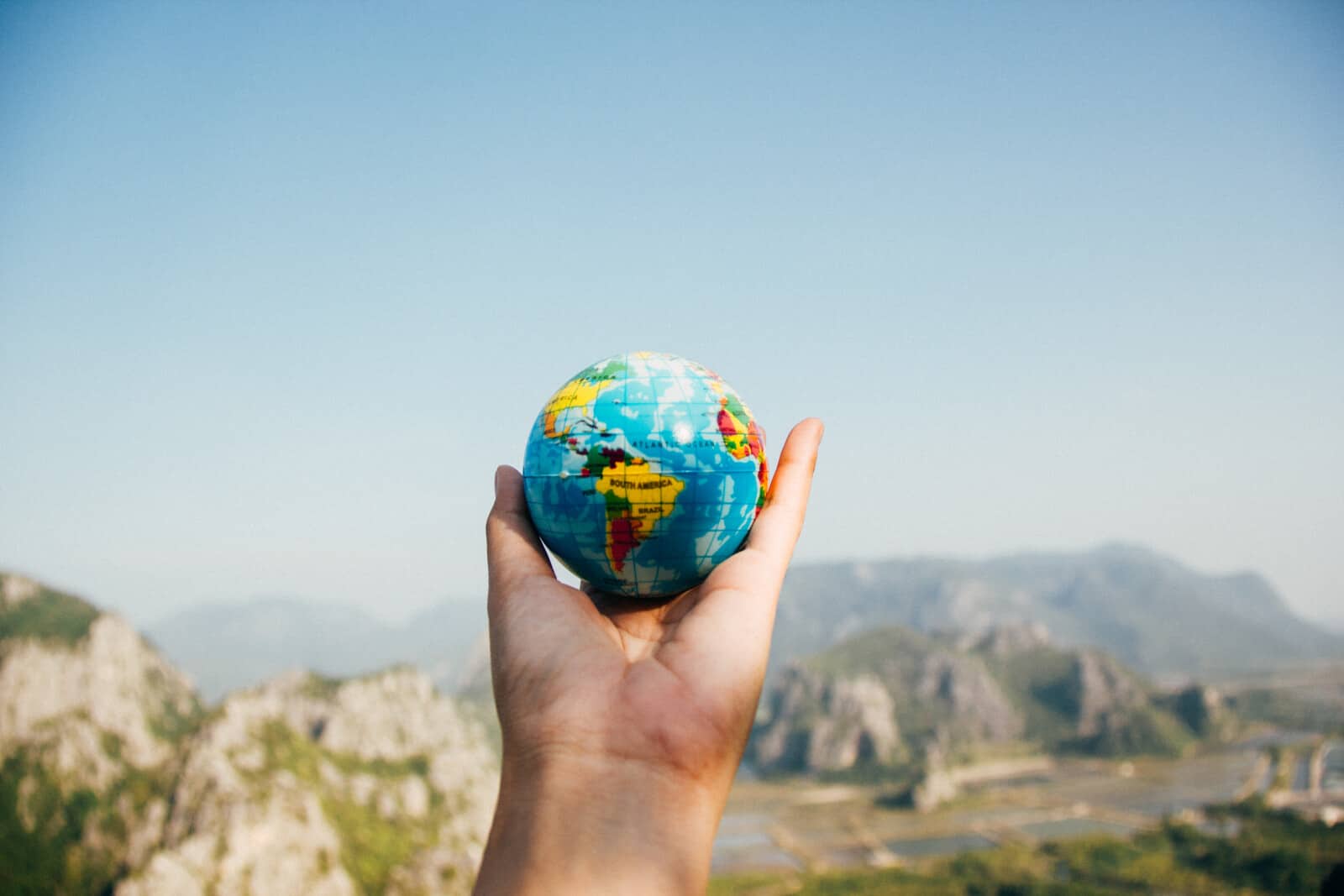

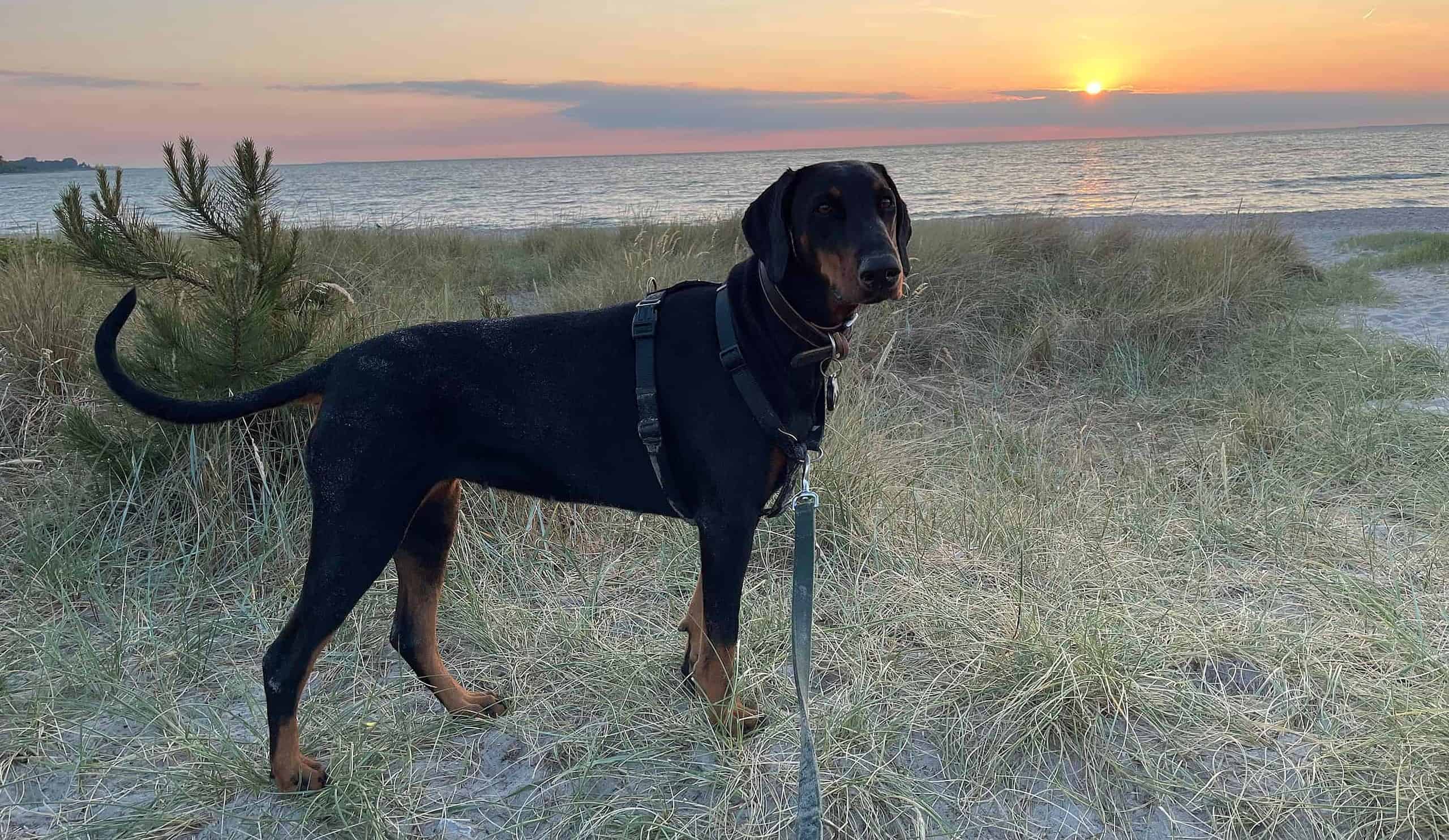
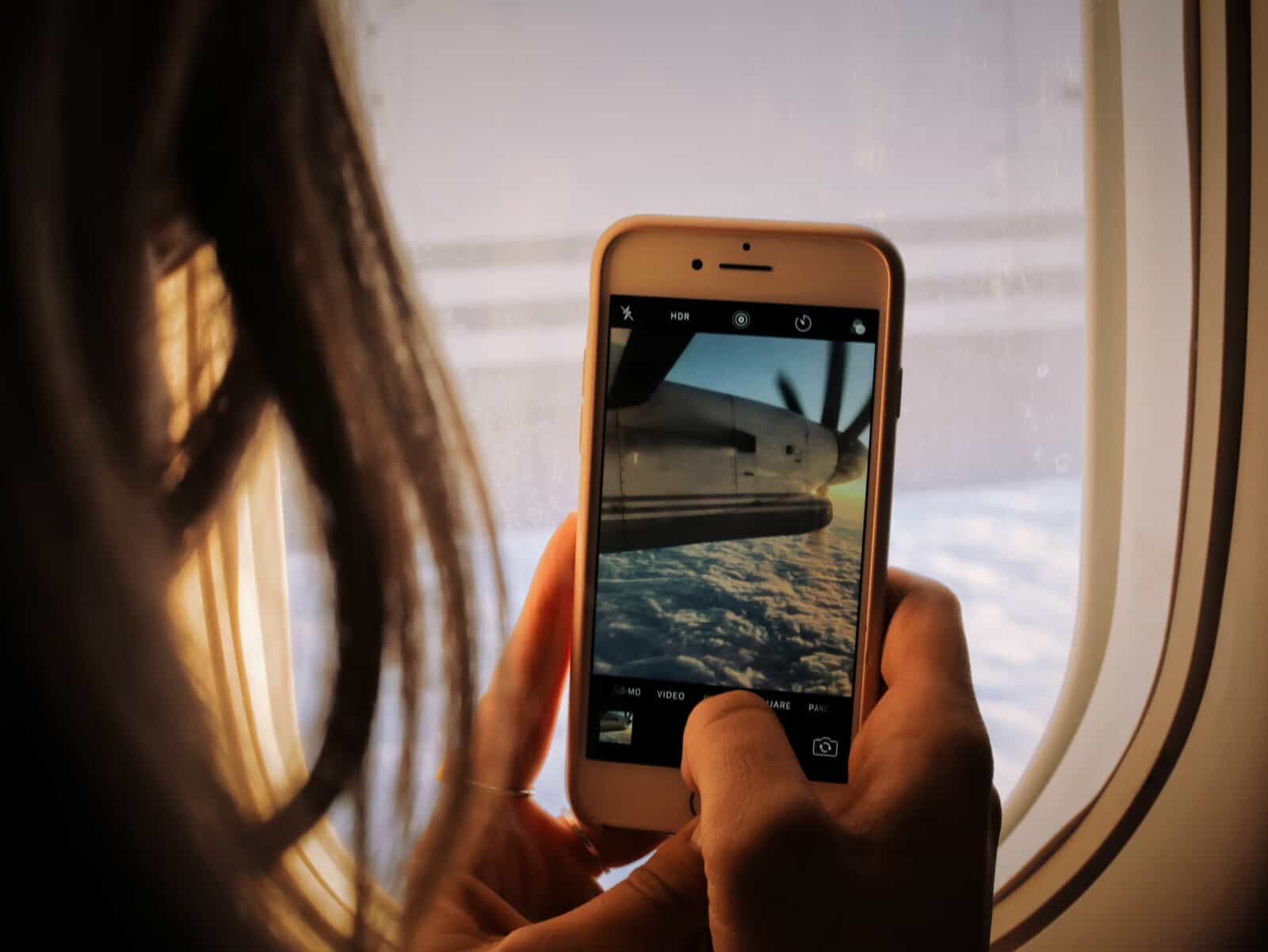
Leave a reply